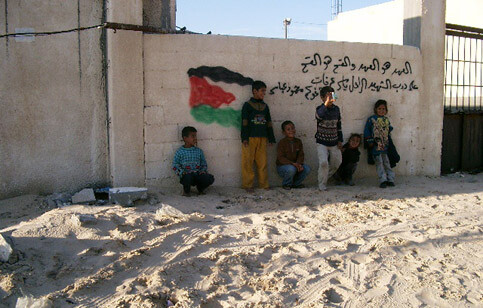United Nations Relief and Works Agency for Palestine Refugees in the Near East 28 February 2005

Palestinian children in Muwasi, Gaza Strip. (Cees Otto)
GENEVA — The United Nations Relief and Works Agency for Palestine Refugees (UNRWA) today presented a blueprint to a better future for four million Palestine refugees to the international donor community in Geneva. The Agency is requesting an additional US$1.1 billion over the next five years to allow it to improve the life chances of the refugees and enhance the ir ability to support themselves.
UNRWA’s Medium Term Plan (MTP) is the product of many months of dialogue between the Agency and the donor community and has been influenced by the recommendations of a major conference held in Geneva in June 2004 to examine the future of humanitarian assistance to the Palestine refugees.
Peter Hansen, UNRWA’s Commisioner-General said: “This is not a presecriptive plan, it is an outline meant to accommodate changing realities and needs on the ground. It is a testimony to the commitment of UNRWA and its donor partners to help the Palestine refugees live in dignity and achieve their ambitions for self-reliance and development.”
In recent years UNRWA’s resources have not kept pace with the growing needs of the refugees and by many indicators the refugees are slipping backwards in comparison with the non-refugees they live amongst. Refugee education and health facilities are often hugely overcrowded and under-equipped. Refugee homes, especially those of the one-third who live in camps, are in a dilapidated condition, while UNRWA’s tools for helping refugees out of poverty are woefully overstretched.
By implementing its MTP, UNRWA would enhance the quality of its education, health and social services but also better promote self-reliance among the refugees by extending the Agency’s micro-credit programme, increasing its provision of vocational training and by upgrading the conditions in the refugee camps.
The MTP has four main objectives: to achieve parity of UNRWA services with host authority and international standards; to address the needs of the most vulnerable refugees; to maximize the economic potential of refugees and to build capacity within UNRWA itself.
In education, priorities include matching host authority curricula, reducing the use of rented schools, reducing classroom overcrowding and creating special educational needs centres to work with the most vulnerable children. In health, the MTP focuses on reducing the excessive workloads of medical staff, expanding psycho-social support and early detection of disabilities for children. The environmental health conditions for the poorest refugees in the camps will also be tackled.
The delivery of social safety-net services will be enhanced by bringing down UNRWA’s social worker-client ratio, expanding the Agency’s network of community centres for women, youth and refugees with disabilities and by increasing the financial assistance the Agency gives to the very poorest refugees. The Agency’s mirco-credit programme will expand the reach of its lending programme and introduce a new housing finance product that will help refugees better their own living conditions. UNRWA will also create a camp development unit to oversee a programme of urban renewal in the 59 refugee camps scattered across the Middle East.
UNRWA is a relief and human development agency, providing education, healthcare, social services, micro-credit and emergency aid to over four million refugees living in the Gaza Strip, the West Bank, Jordan, Lebanon and the Syrian Arab republic. UNRWA is by far the largest UN operation in the Middle East, with over 25,000 staff, almost all of them refugees themselves, working directly to benefit their communities - as teachers, doctors, nurses or social workers.
UNRWA received US$391 million in pledges to its regular and project budgets in 2004. In the same period it also received an additional US$109 million in pledges for its emergency operations in the West Bank and Gaza Strip.
More Information
Related Links

